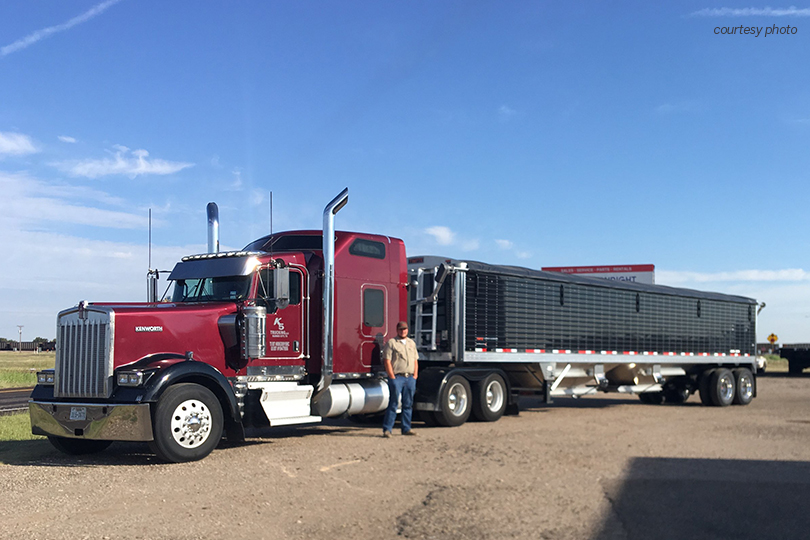By Jennifer Dorsett
Field Editor
The ongoing COVID-19 pandemic caused changes both small and large, direct and indirect, across Texas agriculture.
Despite the additional challenges 2020 has presented, Karnes County farmer Kenworth Krause is still farming and hauling hay, grain and fertilizer for other area farms and ranches.
“We’re very fortunate in my area to have not been hit very hard by the virus,” Krause, who serves as the District 12 representation on Texas Farm Bureau’s Young Farmer & Rancher Advisory Committee, said. “We’ve felt some of the economic impacts from COVID-19 trickle down, but luckily, we’ve just been able to keep trucking and keep going since this whole thing started.”
Krause and his father are co-owners and operators of a small trucking company, K5 Trucking. Since their hometown is located in the middle of the Eagleford Shale formation, the Krauses also haul rock for oilfield operations.
But oil and gas operations have slowed significantly since the pandemic started. The collapse in crude oil pricing combined with a major slowdown in the U.S. impacted the industry.
“Our ag hauling never really slowed down, thank goodness. We’ve actually picked up the pace since we didn’t take vacations or go anywhere this summer,” Krause said. “Grain hauling was down a little bit, but not due to the pandemic. We just had some late season rains here that caused things to not be as good this year.”
In addition to the trucking business, Krause has a small hay operation and manages a herd of about 35 Brahman cattle.
“We do all of our own hay work, do some custom hay baling, custom seeding and shredding, planting and plowing,” he said. “We do a little bit of everything. I’ve been farming and driving a truck since high school, so I’ve been around it my whole life.”
He and his father built the hay business since Krause returned home after college. Krause said they usually bale enough hay to feed their own livestock and sell to area farmers and ranchers.
“Instead of planting grain sorghum this year, we kept all our land in haygrazer, which turned out to be a good decision,” he said. “Since everyone was hurting for hay the past couple of years, we thought instead of raising a grain crop, we’d focus more of our farming efforts on hay. This year’s hay crop is probably the best one we’ve had in years, because of the all the rain. So, it’s really going to pay off for us.”
The rain also allowed him to keep grazing his cattle when prices plummeted earlier this year at the height of the pandemic.
“We actually were able to wait until the first of October to sell our cattle this year, which was a blessing,” Krause said. “We usually sell in the summertime, but we pushed it back, because we were watching the prices. We had enough grass to keep them while prices were so low.”
Krause is thankful the pandemic’s impact has been small enough to not present any major challenges for his business.
“It’s been a long, hectic year, but there’s always next year to look forward to,” he said.
He’s praying for a wet winter and a good start to 2021.
In the meantime, he’ll continue helping other farmers and ranchers grow their crops and transport their goods one truckload at a time.

